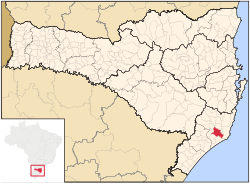Tubarão
Tubarão, Santa Catarina | |
|---|---|
| Nickname: Cidade Azul ("Blue city" in Portuguese) | |
 Location in Santa Catarina Brazil | |
| Country | |
| Region | South |
| State | |
| City Emancipation | May 27, 1870 |
| Government | |
| • Mayor | Manoel Antonio Bertoncini Silva (PSDB) |
| Area | |
• Total | 300.273 km2 (117.1 sq mi) |
| Elevation | 9 m (30 ft) |
| Population (2015) | |
• Total | 102,883 |
| • Density | 340.95/km2 (883.1/sq mi) |
| Time zone | UTC-3 (UTC-3) |
| • Summer (DST) | UTC-2 (UTC-2) |
| Website | Prefeitura Municipal de Tubarão |
Tubarão is a Brazilian municipality located in southern part of Santa Catarina state. It coordinates are 28º28′00″ S and 49º00′25″ W. The population, according to the IBGE/2010 Brazilian Census was 97,281. It is the main city of the Tubarão River basin region, which comprises 20 municipalities and a population of 350,000 inhabitants.
History
Tubarão was named after a native tribal chief called Tubanharô, which means "ferocious father" in Guaraní language. Thus, it does not have any relation to the word tubarão ("shark" in Portuguese). The first settlement, which later became the city, was founded in 1773 by troopers as a halfway point between Laguna and the uplands. Coal was discovered in Tubarão outskirts in the 18th century. The city emancipated from Laguna in 1870. In the following years Italian and German immigrants came to this region and the Tereza Christina Railway was inaugurated in 1884. One of the worst natural catastrophes in Brazil took place in Tubarão, on March 28, 1974. The Tubarão River waters flooded about 80% of urban area. The flood made 199 fatal casualties and left about 45,000 people homeless.
Geography

The city is located 133 kilometers south of Florianópolis, the state capital, in the South Brazilian coast plains. Its urban area is crossed by the Tubarão River and, in parallel, the BR-101 federal highway. Some lakes and swamp areas are found in the surrounding areas, although its landscape has been modified several times by human activity. The climate is subtropical (Köppen climate classification). Neighbor cities are Laguna, Capivari de Baixo, Gravatal, Pedras Grandes, Jaguaruna, São Ludgero, Orleans and Treze de Maio.
Economy
The main economy is based on agriculture (rice plantations), furniture industry and ceramic tiles. Tourism is also important due to its thermal water resources in Rio do Pouso and Guarda da Margem Esquerda localities.
Notable people
Arts
Dener Pacheco (1981–2010) - actor and model
Luiz Henrique Rosa (1938–1985) - musician and soccer player
Willy Zumblick (1913–2008) - painter
Literature
Alberto Cargnin (1925–2007) - romancist and journalist
Walter Zumblick (1908–1989) - historian
Sports
Renan Bressan (1988) - soccer player (Belarus national)
Zenon (1954) - soccer player
Politics
Heriberto Hülse (1902–1972) - Governor of Santa Catarina 1958-1961
Demography

The main ethnic groups are Portuguese-Azorians, German and Italian descendants and Afro-Brazilian. Tubarão is 12th largest city in the state. The total population (IBGE/2010) was 97,281 people.
The most illustrious citizen was Willy Zumblick, German descendant painter. There is a Museum in downtown area named after him.
See also
- Aikanã, an indigenous people of the Brazil's Amazonian lowlands, also called Tubarão
External links
- City hall site
- UNISUL - Universidade do Sul de Santa Catarina, local university
- Tubarão Touristic site(in Portuguese)
- Notisul - Local newspaper(in Portuguese)
- Diário do Sul - Local newspaper (in Portuguese)


